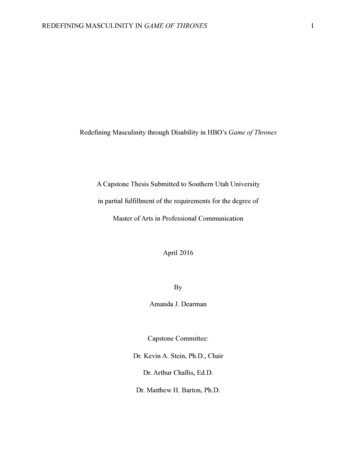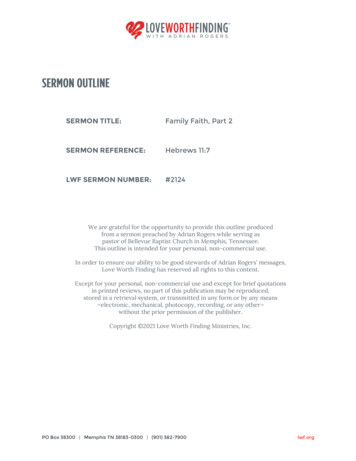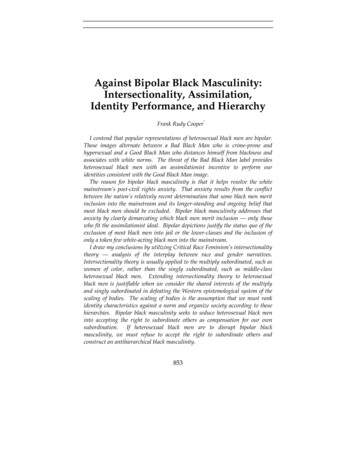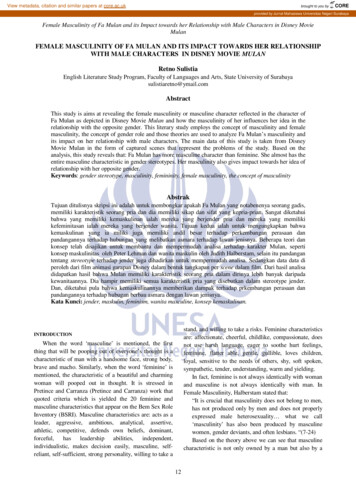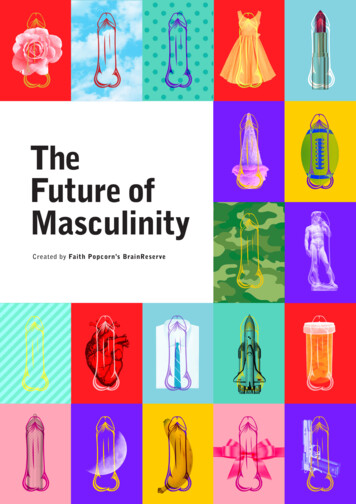
Transcription
TheFuture ofMasculinityCreated by Faith Popcorn’s BrainReserve1
Wondering About Our Cover?Well, it’s certainly not about penis envy, butmore about penis confusion. It expresses anexploration of how masculinity is morphingat this tense time.Too often, masculinity is defined by genitaliaand stereotypes. Stereotypical thinking thata man’s biology dictates aggression, anger,strength and stoicism. Stereotypical beliefsthat society wants to feminize men in thefuture, weaken what it means to be masculine, and push to put a pink bow on theirhuman nature.But what if their nature is changing?What if pink becomes the color of courageand civility?This zine starts a conversation and sharesideas about where masculinity is heading,how it will impact creativity, and howmen will participate in our society anew,personally and professionally. Keep reading.1
In This IssueAn Obituary For Masculinity By Faith Popcorn4Masculinity: Out With The Old, In With The NewBy Faith Popcorn And Michael Kimmel, Ph.D.6Future Of Masculinity: A Poem By Jason W. Tesauro10Reworking The Work World By Amy Nelson12Gender Fluidity Forever By Violet Chachki16A Hope for Masculinity By Rachel Kauder Nalebuff20Marketing To The New Man By Rik Strubel26A Boy, An Alien And An Ad By Jay Russell3060,000 Voices Can’t Be Wrong By Gary Barker, Ph.D.32Contributors343
RIP Masculinity: 300,00 BC – 2018 ADOr at least for old-school masculinity.For centuries, millennia even, menruled. They were hunters and gatherers.They were our providers, our heroes,our bad guys, our cowboys, our soldiers,our leaders.AnObituaryforMasculinityThey told the “little women” what todo. They held the power in politics,the workplace, behind the wheel andeverywhere else. They earned morefor the same job.They were strong, they kept a stiffupper lip, and no one was going topush them around.But suddenly: Change. As a Futurist,I get to say, I told you so. I wrote thebook “EVEolution” in 2000 about howwomen would rise and revolutionizesociety. And it’s happening.The spotlight is on women.They’re earning more degrees (60%of all master’s degrees).They hold more than half of all managerial and professional jobs.In key cities, young women in techare paid more than men – in Detroit,females earn 123% to a guy’s dollar.And the spotlight is also on thenon-binary who refuse to be put ina pink or blue bucket.Men as we used to know them – old,white, running the show, fueled by testosterone, aggression and libido – areon life support. They may have madeit to the polls in November 2016, with63 percent of white men casting theirballots for Trump, but their world andtheir ways are waning.But enough about the past and present.Ahead lies an unfolding. A new sense ofgender, a reinvention of what it meansto be a man.This zine, created with my brilliantpanelists at the Cannes Lions – VioletChachki; Michael Kimmel, Ph.D.;and Amy Nelson – and my team atFaith Popcorn’s BrainReserve, is yourhandbook to Tomorrow, what masculinity will look like, how gender willmorph – and creativity will expand.It’s the biggest, deepest, most transformative shift in our culture – and it’shappening in our lifetime. Join me aswe explore it here and as we push tocreate .The Best Future for all,Faith Popcorn5
Masculinity:Out With The Old,In With The NewFaith Popcorn, Futurist, and Michael Kimmel, Ph.D., Sociologist, talk abouthow masculinity is morphing and what to expect ahead – in corporations andour culture. It’s going to be not just a bumpy ride, but a roller coaster.Faith Popcorn: We are seeing a huge shiftin the culture around gender. It’s a thrilling time for women. They are benefitingfrom the hugest wealth transfer in history– 22 trillion – and they’re earning twicethe educational degrees as men; openingbusinesses at twice the rate of men. Womenare delaying or bypassing both marriage andmotherhood at shockingly high rates: 25%of Millennial females will never wed, andthe U.S. birthrate has been in decline foryears and just hit a record low of 62 birthsper 1,000 women. Add to that the #metooand #timesup movements, and you see whymen are lost. Angry and lost. The statisticthat white men make up 70% of all suicidesin the U.S. is very telling.Michael Kimmel: Depression is massiveamong men. Alcohol abuse, drug abuse,opioid abuse – all of these are thesymptoms of dealing with unbearable pain.They are expressing anger, which is just away of dealing with pain. So what’s makingmen feel so bad?FP: It’s the end of an era for men, of beingthe dominant force in our culture. And thistransition is not an easy one. The groundunder their feet is shifting. How does onebehave? Men don’t know anymore. I’vehad a lot of Fortune 500 male executivesexpress fear about being alone on anelevator with a woman, they’re so worriedabout being #metoo’d.7
MK: What I hear in every corporation ismen saying, "I feel like I’m walking oneggshells." They feel uncomfortable. I say,"Look, women have been uncomfortable inthe workplace for millennia. You've beenuncomfortable for a month. Sit with it fora little bit."FP: I love it. But a lot of men don't knowwhen they're being jerks. They don’t get it.Especially white men 50 . Their definitionof masculinity – how a man should acttough, never cry, be the breadwinner, letwomen raise the kids – all that is dying withtheir generation.MK: Exactly. There was a survey in TheEconomist that asked, “Is it okay to call afemale coworker Honey or Sweetheart? Isit okay to come up behind a woman and giveher a neck massage?” Eighty percent of the18 to 30-year-olds said no. But about threequarters of the men over 60 said it wasperfectly fine. We need reverse mentoring.We assume that older people have all thewisdom and that we can now impart it toyounger people. Wrong. As a Baby Boomer,nobody taught me how to deal with genderfluidity, or being trans. My son who's 19, heknows much better than I do how to dealwith this. And in a corporate setting, thinkof how valued younger people will feel ifthey're being asked to mentor.FP: A terrific idea. Just as we get thatgoing, they’ll have to deal with genderfluidity. We’ll eventually be one gender,really. But for now we’re different pointsalong a gradient. But we are still at asupremely stressful cultural moment forthe short-term. It’s not just men who don’twant to be alone with female coworkersor to mentor them. Women are separatingthemselves: There’s the Wing, a networkof female-only social clubs. And SuperSheIsland is just getting started – awomen-only island retreat. I think therewill be more wariness and separation beforewe learn how to co-exist and feel comfortable. Maybe there will be separate floors inFortune 500 companies, divided by genderidentities. Right now there are 70 different gender identities defined on Facebook.You’d need a skyscraper to separate thedifferent clans before we all learn thatwe can get along and be one gender withinfinite variations.MK: I hear you. I think the separationis happening because men are still notready for women who are strong, equalor superior. For so long, we’ve seen thathaving separate places leads to lower statusfor women. So in that context, if you saywe need a woman-only space, that's veryempowering, right? Because they’ve beenoppressed. But if I say a men-only space,you’ll say uh-oh, that’s a problem since menhave held the power for so long.FP: So maybe it’s also just a transitionalstage we’re moving through. Let’s lookahead on this path. How will we come toa new, better place – with less genderdivisiveness? What do you see drivingchange? I know that as you and I havediscussed, greater equality is good forbusiness. It leads to higher productivity,better returns. Companies with morewomen on their boards perform better, too.MK: Exactly. And younger men are far moreegalitarian fathers than their fathers andgrandfathers were. And they're not resenting it. They're not saying, I wish I could beworking more. Men are actually living farmore egalitarian lives and they're enjoyingmore involvement with the kids, morecaregiving. Social scientists were predictingthat as more and more couples had womenearning more than men that we would seean increase in violence against women.Hasn't happened, right?“Greater equalityis good for business.It leads to higherproductivity, betterreturns. Companieswith more womenon their boardsperform better, too.”FP: Right. I love seeing how brands areengaging in this conversation, like theHarry’s ad (page 30) that ends with theline, “The truth is, there’s no one way to bea man.” Brilliant. Everyone should watch iton Youtube. And I love the recent Axe ads(page 26). Watch those too. We need moreof that: Authentic representations of thecomplexity of being a man.MK: We’re moving away from so manyyears of the same ideology of masculinity:stoic, never show your feelings, powerful.Men getting rich, getting laid. We’restarting to reflect on the truth that men aredoing more housework and childcare; supporting their wives’ careers, coaching theirdaughter's soccer team, and so on. In theinterim men are still strong, stoic, powerful,competitive. But, showing a kinder, gentler,nicer, more nurturing side. I see it in theDove Men Plus Care ads. It's exactly that –traditional men plus care.FP: There are new icons of masculinityin the culture – strong leaders who havetremendous empathy, who aren’t afraid tocry. Barack Obama, Justin Trudeau.MK: Yes. They take gender equality forgranted. Like, of course it's a no-brainer.FP: We need more of this ideology andquick. We don’t just want equality. Wewant superiority. But there are even biggerchanges ahead. Beyond male-female. Andbeyond non-binary. AI is about to transformour culture and relationships. Everyone isfocused on how robots and AI will impactthe workplace, but human relationshipsare about to be rocked. Imagine a bot thatlooks human, smells and feels wonderful,and really, really knows what you want andneed – and can deliver that. It will knowjust how you take your coffee or a cocktail.And can have sex with you the way youwant it and even the way you don’t knowyou want it – it will be programmed forspontaneity and surprise. With those botsamong us, the gender discussion will be justa small facet of a new focus on, what doesit mean to be human? And as we mergewith bots, it becomes an even more urgentquestion.MK: I hear you, but AI and bots are too farin the future for this, uh, “presentist.”FP: I’m just the messenger.And the message is change or die.9
F UT UR EOFMA S C U LI N I TY—Treasonous Jaw (Jason W. Tesauro)masculinity is overratedyet like matter itself,cannotB. destroyedthough it can be separated, unboy-edfrom gender, this mask, your line,is a labyrinth you can cross –to escape and soarboldly face your minotaurnot with brute and ballsrather insteadgather a delicate holdon Ariadne’s red threadC. UR MY FOUL FIESTA UNITFAULTY INFECTIOUS RUMUNTIE YOUR FITFUL SCAM*5,000,000 years from now When we’ve long since shed our skinand jettisoned the peniswhatever else comes between uscan be unscrambled, undamned,reprogrammed betternature rearranged like lettersMY UNFIT, FATUOUS RELICbecauseevery male possesses affinityfor a return to divinitybut first, purge what’s inside of Hethis obsolete trinity:father, son, holy ghostingmen conquering, then coastingand boasting, we boystaught girls not to make noiseyet now the once-brashare withering to ashin this great identity crashand depressionwe unleashed as women’s oppressionin every last professionfor which we were paid20% more than we actually madeA. I FELT MY FURIOUS CUNT50,000 years from now The body is still a templebut let’s redecoratethe furniture is outdated500 years from now The future of masculinityis in the vicinitybeyond cock and its jeerspast the moon, Mars coloniesthese next frontiersneed freer queersinclusion and intuition, mixedwith what’s betwixt our earsis a superior tonicto bionic swordsbeneath an astronaut’s tunicthe wild uncharted,dear sisters and brothersdemands peace fronds, mothers’ breastsnot chevrons and armored chestsA LOUSY MUFF TINCTURE, IF-U, U.S., MY ANTI-EROTIC FLU5 minutes from now O say can you She?stand by Dawn’s gnarly light?ergo,how did you treat femininityup til 5 minutes ago?why on earthwould you try to deceive her?the vagina is both transmitterand receiverof higher vibrationsthan the megahurtsof war, control, body politicsyour time is up, old pricks,holla for the chickstimes are evolvingsee the binary Boy Scouts dissolving?CUM FUNERAL IT FITS YOUthe future of masculinityis an inevitable reactiona faction powerful beyond physical,it’s softer and mysticalbut firmly mobilized to an action,our future no longer masculinearlet’s call it masculabstraction* SKEWER ANY, er, ANSWER KEY:Predicting the future of masculinityis hard. Rearranging the letters ofFUTURE OF MASCULINITY is easy.11
Reworkingthe WorkWorld:5 Ways toGet to EqualWe’re at an insanely tense momentwhen it comes to 9-to-5 life.Can’t we all get along?One innovator spells out thepath to parity and harmony.By Am y N elson, C E O & Fo u n d er, Th e R i ve t e rWe’ve reached The Moment – the onein which Corporate America, with itshierarchies, corner offices and cubes, isdisrupted, disassembled, and reconstructed.This realm was built by and for men in anera when most women worked in the home,and it’s clearly broken. I experienced thisfirsthand as a corporate litigator; I workedmore than 80 hours a week in an environment designed for men – from an inflexibleschedule and large pay gap to the temperature chosen for the office space (yes, it’sset for men). As I became a mother, thepressure increased as I juggled childcarefor my children and the demands ofmy caseload.And I’m not alone in this experience.Today, nearly two-thirds of Americanmothers are breadwinners. Yet almost halfof “highly-trained,” talented mothersofframp at some point after they havechildren, frustrated by a system wheremen still make the rules and dictateevery major decision.The future of work in America – for men,women and those who are gender-fluid –is transforming, and I’m part of that change.I believe that when you aren’t given a seatat the table, you must build your own table.(That’s what I’m doing with The Riveter,creating communities and coworking spacesthat show what work would look like ifwomen led the way.) We all have a role inbringing true equity to corporate America.Here are 5 crucial steps every one of usneeds to take to create – finally – a fairfuture for all. 13
#1Welcomemultitudes ofwomen intoleadership.Only 24 CEOs leading America’s Fortune500 are women. In fact, there are moremen named “John” in America with the titleCEO than there are women in total. But tochange the face of leadership, we must alsochallenge old assumptions – especially thearchaic belief there can only be one womanin any given role. We cannot have just onewoman as a CEO in a given industry. Wecannot have just one woman on a corporateboard. We cannot have just one woman onthe ballot. We need multitudes.#2Share salaries.A woman must earn a man’s dollar, notthe 78 cents white women earn or the 64cents black women make. One way to closethe pay gap is to make information aboutwages more readily available to women sowe know when we’re being paid less. Let’smake a public database that shows how muchemployers pay by type of work, segmented byrace, sex, and ethnicity. The U.S. Congressshould also pass the Paycheck Fairness Act,which prevents employers from retaliatingagainst employees who share informationabout their wages. Transparency about paywill lead to progress.#3Take on thechildcarechallenge.During World War II, American women madeup 65 percent of the industry’s total workforce, compared to just 1 percent beforethe war. This shift was enabled by the U.S.government building a heavily-subsidizedchildcare program. But then Congresseliminated the benefit after the war, creatinga huge barrier for women in the workplace.We need to bring subsidized childcare back.We need everyone to demand it.#4Knowyour bias.Every workplace should mandate trainingin unconscious bias and its implications. Weneed to rethink how we evaluate and growour teams and talent. Women are 15 percentless likely than men to be promoted – and amother is half as likely to be promoted as achildless woman. It’s not about performancebut about opportunity. Men, how do youfeel about your wives, sisters, mothers, anddaughters facing this bias?#5Ignite a conversation.All too often, women speak exclusively withother women about gender-parity issues inthe workplace. Men need to engage directlywith women on these topics. People ofcolor, who are often not in the conversation,must be heard. We cannot change what wedo not know or understand, so it’s vital forall genders and ethnicities to gather, share,and listen.We’re in a tense moment, no doubt.But the path to a place where wecan work together and thrive is clear.And it’s waiting just ahead of us.15
“Androgynyis one of themost beautifulthings ever And it’s the future.”By Violet Chach k iVi o l e t C h a c h k i , w i n n e r o f R u P a u l ’s D r a g Race, drag queen,b u rl e s q u e d a n c e r, m o d e l a n d T V p e r s o n a l ity, explains it all 17
I w as alway s play ing with andr o g yn y a n d m a k e u p a n d a d m i r i n g b e a u ti fu lwom en’s c lothing as a c hild. I we n t to C a th o l i c s ch o o l a n d th e r e we r er eally s tric t gender-specific ru l e s yo u h a d to fo l l ow. S o, I wa s co n s t a n tl yget t ing in trou ble, whic h c aused m e to q u e s ti o n th i n g s .I didn’ t have the oppor tunity to h i d e wh o I wa s . T h e r e ’s a th i n g ca l l e dpas s ing priv ilege (whic h refers to th e b e n e fi ts th a t co m e wi th b e i n g p e rceived as c is by cis gender peop l e ) . I n eve r h a d th a t. I “ ca m e o u t” wh e nI w as born. I was told I was ga y b e fo r e I eve n k n ew wh a t s ex u a l i ty wa s .I s t ar t e d doing drag as a rebe l l i o u s th i n g , a n d fo u n d I wa s g o o d a t i t.M y gig is burlesque – I’m kn own fo r b e i n g r e a l l y s k i n n y a n d we a r i n gcor s et s . B ut those of us who d o d r a g , we d o n ’ t l o o k l i k e m e n o r wo m e n– I t hink we like genderless su p e r-h e r o e s .Day by day, m y gender identity fl ows . I t ch a n g e s . S o m e ti m e s I fe e l m o r elike a wom an, sometimes more l i k e a g u y. I j u s t fl o a t i n b e twe e n – th a t’show I live.Ther e’s not enough represent a ti o n o f th a t g r a y a r e a , a n d I a m h a p p yt o s t and for that in the pu blic e ye. S o ci e ty p r e s s u r e s yo u to ch o o s e o n egender. It’s okay to not be “norm a l ,” to s to p b e i n g h u n g u p o n th e b i n a r y.P h o t og r ap h s : Al b e r t S a n ch e zAndr ogy n y is on e of the most b e a u ti fu l th i n g s eve r – i t’s r e p r e s e n te d a n dr ecr eat ed in the ar t and fashi o n wo rl d s s o m a n y ti m e s . I t’s fa s ci n a ti n gand beautiful. A nd it’s the futu r e.19
A Hope forMasculinityA young woman sharesa beautiful vision of whatit might look like in the future.Will we achieve it?By Rachel Kau d er NalebuffBefore I can talk about male masculinity,I need to tell you about my own relationshipto masculinity as a woman.I spent my teenage years being pulledbetween fear of showing any signs ofmasculinity and shame around myfemininity. Shave your legs, but also don’tshow them. Be desirable, but don’t showthat you have your own desire. All the waythrough college, this impossible dance tookup the introspective energies I had forgetting to know myself. At 27, I’m nowmore able to see that I contain a matrixof gendered traits that are seeminglyincongruous and therefore true. I have alittle mustache and I feel more femininethan ever. When I was 13, I’d bleach theshit out of it. Now I think my upper lip hairmakes me look like a ripe peach. So then:What if my mustache is actually the mostfeminine thing? How can I see someone’sissue with my mustache as their problem?21
As I practice outsourcing shame, Ireclaim my entire self, inch by inch,day by day. I imagine it will take me alife to complete this process.So I wonder about people born as menand how they can come to terms with theirgender. I am not hopeful for men in theU.S. How can they go on this journey whenany deviations from the strictest versionsof masculinity can be fatal? Here a femmeman can be outcast, a trans woman can bebeaten to death.My clearest views of masculinity come frommy trans male friends, my queer friends,my non-American family. My Austriangrandfather – who was delicately wristedand made muesli in the mornings – wasdefined by being gentle and was such a man.In a dream world, what could an Americanmasculinity – especially for cis-men,straight hetero men – that trusts itself –look like? Only when we stop fearingfemininity, and therefore when "emasculation" is neither good nor bad, can masculinity come out of its state of emergency andexpress its complicated truth.How would people who identifyas men talk in this world?How would they move?How would they be together?I can only make out the fragments:In this world, two boys, two men, twopeople can hold hands and this doesn't haveto be charged – it can be exactly what itis, which is swinging your arms together,leading someone through a crowd, beingconnected.In this world, a health teacher says:Let’s talk about gender and how you canpick and choose what you respond to. Andhow this may change over the course of yourlife. Enjoy trying on different combinations!I’m pumped to see what you pick.In this world, a football team chants:We are afraid! We are afraid! Everybody,instead of the anthem, let us now pray forour safety!In this world, a man would immediatelyfight for domestic workers rights, for sexworkers rights, for parental leave, for universal health care, for gun control reform.Because in this world, men would know thatcare work is all our work. Because caringfor the world could be an expression ofmasculinity.In this world, a man would show upto the staff meetings and say:I made muffins for everybody.The ratio of muffin-making and snackbringing would be the same across allgenders – because no one would beself-conscious about caring for the officecommunity, and because no one would becompensating for insecurities around their“.a health teachersays: Let’s talk aboutgender and how youcan pick and choosewhat you respond to.”professional worth by bringing food.Muffins would no longer be a litmus testof power. They could just be muffins.We should hire Allie because she isinvested in the future of the world andgreat at delegating responsibilities.In this world, a man can walk downthe street and say to another man:In this world, my father could say:Hey buddy, just wanna say you'relooking great today, or Man, Ilove your necklace.And it is taken simply as a compliment.In this world, when men discussemploying female parents they say:I have a feeling, I don't know what it isbut I just need to sit with it.In this world, the President (if thepresident is still a cis hetero man)could say:Our country is not great.Our history is not great.23
The only thing that would make us greatwould be to acknowledge this.In this world, a man can sayto his partner:In this world, a man is not as concernedwith spreading his legacy as he is withexploring who he is while he is alive.Because we trust that who we are rightnow and how we are repairing and caringfor the world – that’s what really matters.I am lost.I am sad.I am not sure of what I’m doing with mylife and my career and how I’m givingback to the world.Because he is human, too. And weunderstand that he is and allowed to be.And because emotional honesty isn’tmutually exclusive with strength. In fact,it’s viewed as a sign of inner strength.In this world, a man explains to someoneon a date:I wanted to meet up with you becauseyou seem really wise.In this world, a man says his role modelis his grandmother.In this world, it is as common for a man todate someone older as it is to date someoneyounger because there is no need for ahierarchy in a relationship to compensatefor insecurity.In this world, one man lifts weights andanother goes to dance class because itmakes them feel good, not because theyhave anything to prove.In this world,a man will be Tweet @faithpopcorn with thehashtag #futuremasculinityhow you would finish this sentence25
Marketing tothe New ManThat Was Then:Late 2000’sAxe used to show the underdog, a guy whowasn’t good-looking but had somethingspecial, something clever. He wasn’t the typewho’d stand a chance with beautiful sexywomen – but our brand helped him find away to attract her. We broke the stereotypein our own way.Then we realized we needed a change. Wespoke to 3,000 guys around the world for18 months. The idea of dating conquest didn’tresonate anymore. They said the dating gamewas about mutual connection – unique attributes that bring two people together. Theyfelt more pressure than ever because therewas the stereotype of manhood and thenalso rising goals of being more multifaceted:kind, caring and funny.We spoke with Rik Strubel, GlobalVP at Axe/Lynx, about how his teamdecoded where guys are going –and accelerated their evolution.Here’s the timeline.27
In a Yearof MagicalThinking: 2016Tomorrow’s ManA decade ago, the ideal of masculinity wastough, self-reliant, stoic, violent at times. Theemerging definition is individual, complex andrelaxed. Guys want to explore what it meansto be a man, develop a balance between traditional and new values, and make their owndecisions about gender fluidity.So we went out with “Find Your Magic”which launched during the Super Bowl in2016. It showed that each man has his ownspecial thing, a talent, a certain look thatmakes him attractive. We threaded throughmore messaging about gender: We showedwomen driving the car, not the guy – subtlemessage that this is a game of equals – andguys really appreciated that.UncoveringWhat’s OK: 2017What Will It Taketo Get ThereTo watch the ad: https://bit.ly/2k9APvyNext we worked with Google to find out what guys wondered when they werealone, which led to our “Is it okay for guys to ?” ads. This was about pushingthe definition of masculinity by opening the discussion. We don’t dictate, thebrand doesn’t intervene. The audience decides for themselves.We have a lot to accomplish: Structuralbarriers to equality for women need to beremoved, and the societal barriers holdingmen back must be addressed. If a guy sayshe’s struggling, he’s quickly mocked and shutdown, which is negatively impacting mentalhealth. Men need to be able to share theiremotions without fear.The CreativeChallengeMy plea to those of us in advertising andmarketing is whenever you have the chance,break out of outdated act-tough stereotypes.Help broaden the definition of masculinityand let men decide what kind of men theywant to be – they will thank you. And creativity is vital – helps change the status quoand explore issues. Personally, I think havinga laugh is a great way. Use irreverence andhumor to unlock the conversation about masculinity. Guys will be happier, women will behappier, and your business will be better.To watch the ad: https://bit.ly/2pVfAPl“I hopegenderroles will beobsolete in10 years –and peoplewill befree to bethemselves.”29
A Boy,an Alien& an AdHow the grooming brand Harry’s istackling a tough conversation aboutmasculinity with a charming filmHarry’s, the shaving company, put a tenderspin on the gender debate with a recentbuzzed-about short film, “A Man Like You.”In it, an alien comes to earth, meets a boy– who’s grappling with his father’s absence– and asks how to be a man. After offeringsuch advice as “A man has to be strong,”“Men know stuff, like cars, sports, how togive a good handshake” and “A real manwants to be taken seriously,” the boy windsup acknowledging, “There really aren’t anyrules honestly The truth is, there’s no oneway to be a man.” We asked Jay Russell,Chief Creative Officer of the agency GSD&M,how the film came to be – and what rolemarketing must play today and tomorrow.Q. What inspiredthis film?A. Harry’s point of difference is its purpose,which is to change the face of masculinity.So we’re always thinking and talking aboutmasculinity, and in particular about howmen are portrayed as emotionally unavailable and never vulnerable. In one of thosediscussions, the conversation was about howhard it is to explain what masculinity is –like, if you were trying to define it for analien, what would you say? That was thestart. And where we ended was that theremay not be one clear answer, but we need thecultural consciousness to allow uncertaintyand vulnerability. That’s the path forward.Q. Do you thinkmarketing can triggercultural change? Canthe industry’s worklead to a better future?A. We’re always asking, Is marketing amirror of what’s happening in the culture,or do we lead it? We definitely lead. Peopleemulate what they see in ads, so we have apowerful responsibility to portray things asthey should be.Q. The film has beenhailed as a fascinatingway to furtherthis conversation.What told you thatit was a success?A. My wife said, “You’ve done a lot in yourcareer, but this is the first thing you’ve donethat really matters.” That’s my #1 audience!But beyond that, I think we’re all aware thatthis is a historic moment in time for culture –and there’s a movement happening. The filmcame together before Weinstein and everything else, and became part of the culturalconversation. As it should be: Harry’s wantsto change culture rather than just sell razors.To watch the short film,go to https://bit.ly/2rRKUBk31
60,000 VoicesCan’t Be WrongWhat’s going on globally with menand gender equality? Are things gettingbetter, worse – both? We spoke toGary Barker, Ph.D., CEO of Promundo,to find out. He steers the IMAGES(International Men and GenderEquality Survey), which has gatheredinsights from 60,
Faith Popcorn's BrainReserve, is your handbook to Tomorrow, what mascu-linity will look like, how gender will morph - and creativity will expand. It's the biggest, deepest, most trans- . Fortune 500 companies, divided by gender identities. Right now there are 70 differ-



